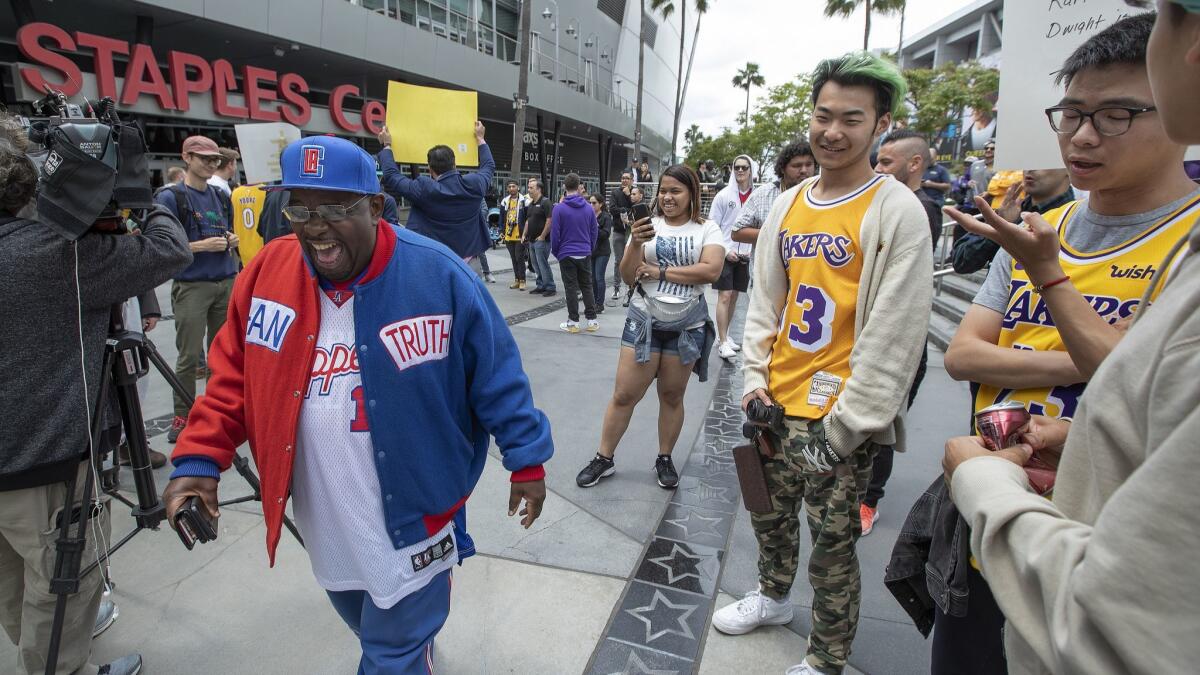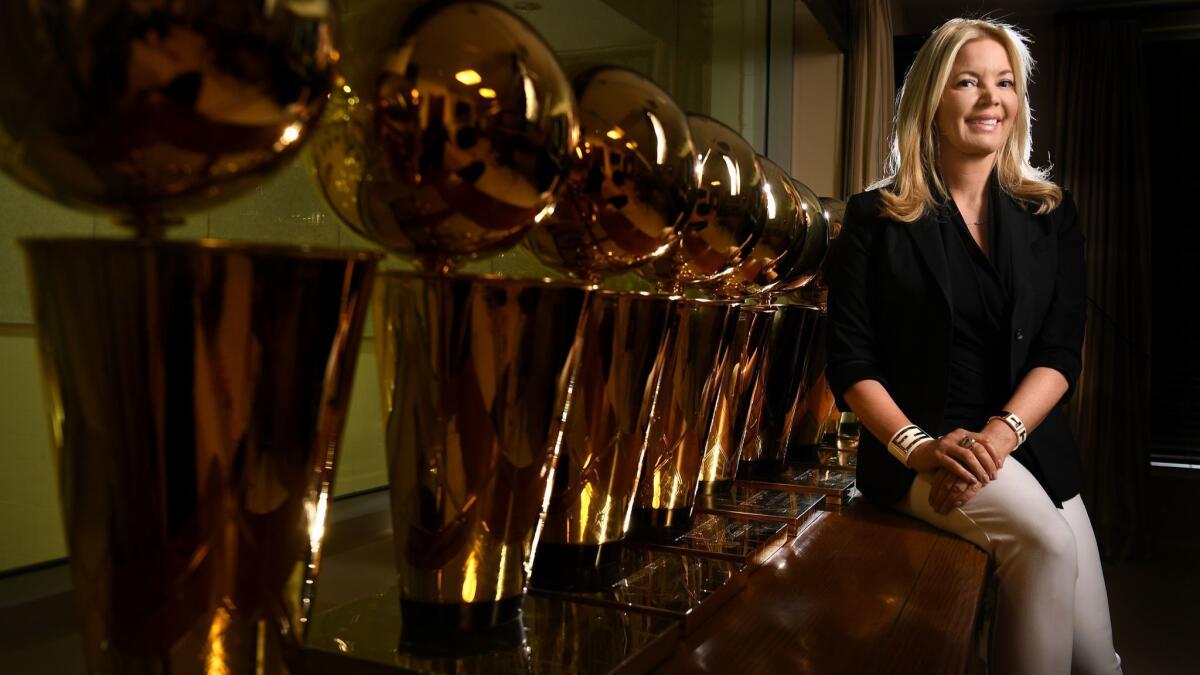Column: Clippers shed ‘little brother’ status while Lakers lean on legacy

- Share via
As Snoop Dogg made the media rounds during the NBA Finals, he echoed a familiar opinion we’ve heard around Los Angeles for years. “The Clippers are the Lakers’ little brother,” he said. “They’re always going to be our little brother.”
He isn’t necessarily wrong. From 1976 to 2011, the Clippers franchise had four postseason appearances, three winning seasons and one playoff series win. During the same stretch, the Lakers went to the playoffs 35 times, the NBA Finals 16 times and won the championship 10 times.
Calling them a “little brother” during this period would actually be an insult to little brothers everywhere.
The Lakers and Clippers, however, aren’t brothers and they aren’t people. They are simply teams defined by the actions of the owners, players and coaches.
For most of that time the Lakers were owned by Jerry Buss, a Hall of Famer who is generally regarded as one of the best team owners in sports history, while the Clippers were owned by Donald Sterling, who was forced to sell his team and is banned for life from the NBA after making racially inflammatory comments.
It’s no coincidence that the teams mirrored the men who owned them. People make businesses, not the other way around. The Lakers became the “big brothers” because of current and future Hall of Famers like Buss, Jerry West, Elgin Baylor, Wilt Chamberlain, Gail Goodrich, Bill Sharman, Magic Johnson, James Worthy, Kareem Abdul-Jabbar, Jamaal Wilkes, Pat Riley, Kobe Bryant, Shaquille O’Neal and Phil Jackson.
The Clippers became the “little brothers” because they were run by an incompetent owner who refused to pay for the best players and coaches. They not only have no championship banners, but not a single player’s jersey has been retired. Taylor Swift, who has a banner for the record for sold-out shows, has a more permanent presence at Staples Center than any Clippers player.
While the Lakers’ success under Buss was not a coincidence, their downfall since his passing in 2013 is no accident either. A franchise that had missed the playoffs just five times from 1948 to 2013 has now missed the playoffs six consecutive years and has the worst combined record in the league during that time. The Clippers meanwhile have had a winning record the last eight seasons and have made the playoffs in seven of those years.
As unfathomable as that might seem, it makes sense if you begin to view the Lakers as a regular business rather than a storied sports franchise.
Imagine being a regular at a restaurant that was owned by a renowned chef who famously hired the best staff in the world. It consistently won national awards and was held up as the gold standard in culinary circles. One day the owner passes away and the staff that had made it such a special place either leaves or retires soon after. A few years later the restaurant, which has fallen on hard times, is owned by the chef’s daughter who has hired an inexperienced staff while the food and service have fallen well below its previous high standards. Would you still frequent that restaurant just because the sign outside of the building is the same?
Probably not. You’d take your business elsewhere. But we don’t consume sports the same way we consume food. We’re told to follow teams, not players. I’ve followed my barber and favorite sushi chef to at least five different locations over the last decade. That makes me a loyal customer in the real world. In sports that just makes me a “bandwagon fan.”
So when someone who grew up in Los Angeles wonders why a free agent would ever sign with the Clippers over the Lakers, it’s important to understand these players are making a decision based on current circumstances, not old stereotypes that are no longer relevant.

The Lakers’ old power structure of Buss, West and Riley, and later Buss, West and Jackson, was an understandable draw for players who wanted to win championships under those Hall of Famers. That simple three-dot line is now a confusing scatter plot led by Jeanie Buss, Rob Pelinka, Kurt Rambis, Linda Rambis, Tim Harris, Jesse Buss and Joey Buss, who were all involved in the recent disorganized coaching search. It’s a crowded room devoid of a Hall of Fame voice. Compare that to the Clippers, who will walk into pitch meetings this summer with Steve Ballmer, the wealthiest owner in professional sports, a championship-winning coach in Doc Rivers and a championship-winning player and executive in West.
Sign up for our daily sports newsletter »
Fans harping on the disparity in banners between the franchises are like the new general manager of that old restaurant you used to like, pointing to all the Michelin star plaques on the wall, which came thanks to the chef and staff who are no longer there. The restaurant remains, the stories the walls could tell are incredible, but the people that made it famous are long gone.
That doesn’t mean a big free agent won’t join the Lakers next month. The Lakers are still one of the most famous brands in sports, located in one of the greatest cities in the world, and boast arguably the best player in the game when he’s healthy in LeBron James. But you’re living in the past if you’re still questioning why any player would pick the Clippers over the Lakers at this point.
The Clippers might always be the “little brother” to the Lakers in the eyes of history and longtime Lakers fans such as Snoop Dogg. But free agents aren’t tying their future to history books; they’re tethering it to those people currently running the team. They will make their decision based on the people in the room recruiting them, not the old banners and jerseys hanging on the walls.
More to Read
Go beyond the scoreboard
Get the latest on L.A.'s teams in the daily Sports Report newsletter.
You may occasionally receive promotional content from the Los Angeles Times.











